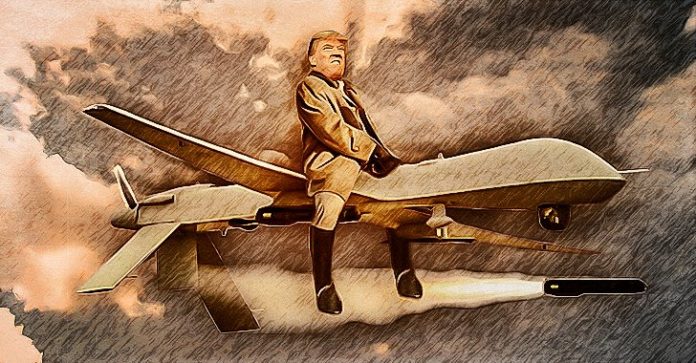
by Carey Wedler at theantimedia.org
When he was in office, former President Barack Obama earned the ire of anti-war activists for his expansion of Bush’s drone wars. The Nobel Peace Prize-winning head of state ordered ten times more drone strikes than the previous president, and estimates late in Obama’s presidency showed 49 out of 50 victims were civilians. In 2015, it was reported that up to 90% of drone casualties were not the intended targets.
Current President Donald Trump campaigned on a less interventionist foreign policy, claiming to be opposed to nation-building and misguided invasions. But less than two months into his presidency, Trump has expanded the drone strikes that plagued Obama’s “peaceful” presidency.
According to an analysis from Micah Zenko, an analyst with the Council on Foreign Relations, Trump has markedly increased U.S. drone strikes since taking office. Zenko, who reported earlier this year on the over 26,000 bombs Obama dropped in 2016, summarized the increase:
“During President Obama’s two terms in office, he approved 542 such targeted strikes in 2,920 days—one every 5.4 days. From his inauguration through today, President Trump had approved at least 36 drone strikes or raids in 45 days—one every 1.25 days.”
That’s an increase of 432 percent.
He highlights some of the attacks:
“These include three drone strikes in Yemen on January 20, 21, and 22; the January 28 Navy SEAL raid in Yemen; one reported strike in Pakistan on March 1; more than thirty strikes in Yemen on March 2 and 3; and at least one more on March 6.”
The Trump administration has provided little acknowledgment of the human toll these strikes are taking. As journalist Glenn Greenwald noted in the Intercept, the Trump administration hastily brushed off recent civilian casualties in favor of honoring the life of a single U.S. soldier who died during one of the Yemen raids just days after Trump took office:
“The raid in Yemen that cost Owens his life also killed 30 other people, including ‘many civilians,’ at least nine of whom were children. None of them were mentioned by Trump in last night’s speech, let alone honored with applause and the presence of grieving relatives. That’s because they were Yemenis, not Americans; therefore, their deaths, and lives, must be ignored (the only exception was some fleeting media mention of the 8-year-old daughter of Anwar al-Awlaki, but only because she was a U.S. citizen and because of the irony that Obama killed her 16-year-old American brother with a drone strike).”
Greenwald notes this is typical of not just Trump, but the American war machine in general:
“We fixate on the Americans killed, learning their names and life stories and the plight of their spouses and parents, but steadfastly ignore the innocent people the U.S. government kills, whose numbers are always far greater.”
Though some Trump supporters sang his praises as a peace candidate before he took office, the president’s militarism was apparent on many occasions. He openly advocated increasing the size and scope of the military, a promise he is now moving to keep. And as Zenko highlights, Trump was disingenuous with his rhetoric against interventionism:
“He claimed to have opposed the 2003 Iraq War when he actually backed it, and to have opposed the 2011 Libya intervention when he actually strongly endorsed it, including with U.S. ground troops. Yet, Trump and his loyalists consistently implied that he would be less supportive of costly and bloody foreign wars, especially when compared to President Obama, and by extension, former Secretary of State Hillary Clinton.”
As Trump continues to dig his heels into decades-old policies he has criticized himself — reportedly mulling over sending ground troops into Syria — he is increasingly proving to be yet another establishment warmonger implementing policies that spawn the creation of more terrorists. As Zenko concludes:
“We are now on our third post-9/11 administration pursuing many of the same policies that have failed to meaningfully reduce the number of jihadist extremist fighters, or their attractiveness among potential recruits or self-directed terrorists. The Global War on Terrorism remains broadly unquestioned within Washington, no matter who is in the White House.”
Creative Commons / Anti-Media / Report a typo




